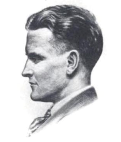The Great Gatsby by F. Scott Fitzgerald
Page 18 of 25 - 1 2 3 4 5 6 7 8 9 10 11 12 13 14 15 16 17 18 19 20 21 22 23 24 25 Purchase full notes for £6.95 (aprox $10.84)
51 ‘Instead of rambling, this party had preserved a dignified homogeneity, and assumed to itself the function of representing the staid nobility of the countryside – East Egg condescending to West Egg’ – The division between the farmlands of the hinterland and the new cities of the coast – the agrarian world against the industrial – still lies at the heart of social divisions in America according to Nick. As has been frequently pointed out, there were really two versions of the American Dream current in Fitzgerald’s time. The oldest strata of the idea was that of the first settlers who tried built a religious utopia in the New World; later, this was replaced by the vision of Jefferson and Franklin that any American could make a private utopia by owning his own land and prospering (the same dream Lennie has of a little farm with George in John Steinbeck’s Of Mice and Men ). Later, however, the ‘dream’ became urbanised and industrialised and became based solely on the acquisition of wealth by any means – and preferably without much effort. Gatsby and West Egg – to an extent at least – represent this new ‘urban dream’, whereas the Buchanans, Jordan’s ‘staid’ party and East Egg generally represent (at least in this passage) the old ‘agrarian dream’. Nick’s sympathies are with the ‘old’ dream – ‘Gatsby… represented everything for which I have an unaffected scorn’ he has told the reader (8).
51 ‘I had never met him, she said, and it was making me uneasy.’ – A polite excuse, but one which suggests that Jordan is sensitive to Nick’s feelings. His desire to meet the host is a good example of his ‘East Egg’, old American, sensibilities.
51 ‘The undergraduate nodded in a cynical, melancholy way.’ – He has noted the fact that Nick and his date are teaming up. His cynicism probably has a sexual tinge, given his love for ‘violent innuendo’. It is remarkable how Fitzgerald manages to give such a strong impression of character with so few words.
51 ‘A stout middle-aged man with enormous owl-eyed spectacles’ – It is the ‘enormous’ size of this man’s glasses as well as the sense of an ‘owl’ looking down to the ground from above that implies the symbolic connection with T.J. Eckleburg’s eyes looking down on the ‘valley of ashes’. ‘Owl-eyes’ broadens the theme of observation: he epitomises the forensic investigation and judgement of those who would penetrate Gatsby’s mystery. Notably, he will give an antithetical judgement to Nick’s ‘Gatsby turned out all right at the end’ (8) when he states ‘The poor son-of-a-bitch’ (182) at the conclusion of the book. So far he has discovered that Gatsby’s books are real, but uncut – precisely as they should be a rich man’s library (cf. ‘Knew when to stop, too – didn’t cut the pages’ (52)). There is perhaps something inherently fake about getting things so right , but Fitzgerald is intent upon creating layer upon layer of ambiguity in his presentation of Gatsby.
51 ‘I had never met him, she said, and it was making me uneasy.’ – A polite excuse, but one which suggests that Jordan is sensitive to Nick’s feelings. His desire to meet the host is a good example of his ‘East Egg’, old American, sensibilities.
51 ‘The undergraduate nodded in a cynical, melancholy way.’ – He has noted the fact that Nick and his date are teaming up. His cynicism probably has a sexual tinge, given his love for ‘violent innuendo’. It is remarkable how Fitzgerald manages to give such a strong impression of character with so few words.
51 ‘A stout middle-aged man with enormous owl-eyed spectacles’ – It is the ‘enormous’ size of this man’s glasses as well as the sense of an ‘owl’ looking down to the ground from above that implies the symbolic connection with T.J. Eckleburg’s eyes looking down on the ‘valley of ashes’. ‘Owl-eyes’ broadens the theme of observation: he epitomises the forensic investigation and judgement of those who would penetrate Gatsby’s mystery. Notably, he will give an antithetical judgement to Nick’s ‘Gatsby turned out all right at the end’ (8) when he states ‘The poor son-of-a-bitch’ (182) at the conclusion of the book. So far he has discovered that Gatsby’s books are real, but uncut – precisely as they should be a rich man’s library (cf. ‘Knew when to stop, too – didn’t cut the pages’ (52)). There is perhaps something inherently fake about getting things so right , but Fitzgerald is intent upon creating layer upon layer of ambiguity in his presentation of Gatsby.

